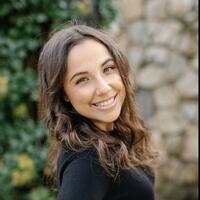Safely securing a world-class education with values that align with Jewish ideals
At 18, Ellie Nathan had her future mapped out: accepted early decision to Barnard College, she was set to pursue her pre-med dreams at an Ivy League school.
Then came Oct. 7, and college campuses across the country erupted in anti-Israel protests; protests that were particularly virulent at Barnard, and its across-the-street affiliate, Columbia University.
Nathan’s commitment began to waver; speaking with Jewish students on campus, she was appalled. “They told me, ‘People scream at you every time you walk across campus, but it’s not that bad, you get used to it. You just can’t take it too seriously,’ Nathan said. “Being verbally abused was part of their everyday routine. I couldn’t imagine living like that.”
Learning about Yeshiva University’s extended transfer deadline, she seized the opportunity, and in fall 2024, the Long Island resident will start Stern College for Women as a pre-med Honors student, joining many high school friends.
“Switching to YU feels right on so many levels,” Nathan said. “The Honors program is amazing, Stern’s 95% track record for getting girls accepted into medical school is unheard of, and I love that learning Torah is ingrained into the everyday schedule. That combined with the supportive environment of shared values made the decision so clear, and has given me a sense of clarity and peace I haven’t felt in a long time.”
Nathan and many others from Ivy League universities like Cornell, Penn, and Columbia, as well as from other universities like BU, NYU and Michigan are making the move thanks in part to YU’s new Blue Square Scholars program, created with a $1 million grant from Robert Kraft to help the University take in transferring students who are switching to YU for its quality education and nurturing campus atmosphere. The program furthers the university’s efforts to support Jewish college students throughout the country, providing the necessary infrastructure to accommodate the best and the brightest who are drawn to the university’s values of Jewish idealism and taking a strong stand for Israel.
“YU is a safe and welcoming home from the antisemitism many students on today’s campuses are facing,” said Rabbi Dr. Ari Berman, President of Yeshiva University. “No Jewish student should have to face the threats and intimidation that has sadly been taking place. While we extend our hand to be of any assistance in supporting efforts by universities to protect their students, we proudly stand with all Jewish students by offering them a values-based, world-class education in a safe and supportive environment.”
After Oct. 7, Eliana Samuels — accepted early decision to Columbia — also began to doubt her choice.
“The idea of being on a campus where I have to avoid certain people and places, where I’m afraid of getting hate crimed, and where I can’t tell anyone that I’m a Zionist or Jewish because of what they might do to do me, was genuinely terrifying,” said Samuels, 19.
It wasn’t long before she and her parents decided Stern was a much better option; she’ll begin Stern College for Women as a pre-med Honors student in fall 2024. “I’m looking forward to being in a place where I can be myself and get a great education,” Samuels said. She’s particularly excited about the guidance Stern provides on her path to medical school, including class selection, research opportunities, and med school applications. “I thought I would have to fend for myself, but at Stern, there’s so much personal attention and support, especially for pre-med students.”
Zachary Magerman, who just completed his sophomore year at the University of Pennsylvania, was already considering a move to Yeshiva University before Oct. 7. For him, the subsequent anti-Israel protests at Penn and the administration's lack of support highlighted a deeper issue: his values didn't align with those of the university and its students. In fall 2024, Magerman, a psychology and cognitive science major, will join YU as a junior.
Although active in Penn’s Jewish community, Magerman — who spent two years in yeshiva in Israel before beginning college — craved a stronger connection to Judaism and the values it represents. YU, he felt was the perfect fit. “At YU, people care about making a difference, they’re focused on self-growth, and they strive for communal success and idealism through Torah life,” he said. “They share my own priorities.”
While Magerman is considering semicha or a master’s degree in psychology at YU, right now he is particularly excited by the unique opportunity to learn from Torah giants like Rabbi Hershel Schachter and Rabbi Itamar Rosensweig.
“Coming to Yeshiva University is a testament to my own growth,” he said. “I’m ready to prioritize what really matters to me: making the world a better place, and fighting for and living the Torah’s timeless values in an institution that stands up for these ideals.”
Even graduate students are making the move to YU.
After spending a post-college year teaching English in Madrid, Ashley Byck, 23, was excited to begin her master’s in speech-language pathology at Columbia. She began to question her decision after Oct. 7, but the turning point came when she learned that many Jewish students had switched to online classes to avoid harassment on campus. “That was shocking,” said Byck, the great-grandchild of Holocaust survivors. "The sense of isolation, hatred, and exclusion was overwhelming. It was alarming to see such blatant antisemitism, and even worse to witness the student body’s and administration's indifference. We've always said ‘never again,’ and yet, there it was."
By the spring, Byck had withdrawn from Columbia and had applied and committed to the SLP program at YU’s Katz School of Science and Health. She was drawn by YU’s sense of community and the program’s stellar reputation. “I knew I would thrive there,” she said. “From the beginning they’ve provided a lot of hands-on guidance, the academics and faculty are great, the classes are very engaging, and I appreciate that the program is holistic and structured. It's important for me to earn my degree in a place where I feel accepted and safe, where there seems to be no room for hatred.”



